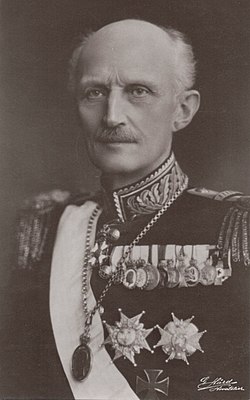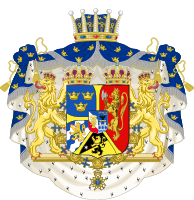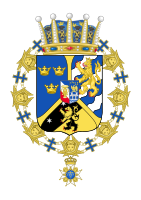Prince Carl, Duke of Västergötland
| Prince Carl | |||||
|---|---|---|---|---|---|
| Duke of Västergötland | |||||
 Photograph of Prince Carl, c. 1930 | |||||
| Born | 27 February 1861 Arvfurstens palats, Stockholm, Sweden | ||||
| Died | 24 October 1951 (aged 90) Stockholm, Sweden | ||||
| Spouse | |||||
| Issue | |||||
| |||||
| House | Bernadotte | ||||
| Father | Oscar II of Sweden | ||||
| Mother | Sophia of Nassau | ||||
Prince Carl of Sweden and Norway, Duke of Västergötland (27 February 1861 – 24 October 1951) was a Swedish prince. Through his daughters Märtha and Astrid, for whom he arranged dynastic marriages, he is an ancestor of current members of the Grand Ducal Family of Luxembourg, Belgian royal family and Norwegian royal family.
Early life
[edit]

Prince Carl was born on 27 February 1861 at his parents' residence in the Arvfurstens palats (Palace of the Hereditary Prince), an 18th century palace located at Gustav Adolfs Torg in central Stockholm. Born into the House of Bernadotte, he was the third son and child of the then Prince Oscar and Princess Sophia. His father was the younger brother and heir presumptive of the reigning king of Sweden-Norway, the sonless King Charles XV, and his mother was the youngest daughter of Wilhelm, Duke of Nassau. Upon the death of Charles XV on 18 September 1872, Carl's father ascended the Swedish and Norwegian thrones as King Oscar II.

Carl was known as "the Blue Prince" (Blå Prinsen) because he often wore the blue-coloured uniform of the Life Regiment, to which he belonged in a ceremonial manner.[1]
Marriage and children
[edit]
In May 1897, Prince Carl was engaged at the age of 36 to the 18-year-old Princess Ingeborg of Denmark, the second daughter of King Frederik VIII of Denmark. Ingeborg's mother, Louise of Sweden, was a first cousin of Prince Carl, and they were, therefore, first cousins once-removed. The engagement was arranged, and in 1947, on the occasion of their 50th wedding anniversary, Carl admitted that their marriage had been completely arranged by their respective fathers, and Ingeborg herself added: "I married a complete stranger!"
The couple were married on 27 August 1897 at the chapel of Christiansborg Palace in Copenhagen and spent their wedding trip (honeymoon) in Germany. The couple had four children:
- Margaretha (1899–1977), who married Prince Axel of Denmark
- Märtha (1901–1954), wife of Crown Prince Olav of Norway and mother of Harald V of Norway
- Astrid (1905–1935), wife of Leopold III of Belgium and mother of kings Baudouin and Albert II of Belgium, as well as Grand Duchess Joséphine Charlotte of Luxembourg.
- Carl, Duke of Östergötland, known as Carl Jr., later Prince Bernadotte (1911–2003).
All of Carl's children grew up to be healthy adults. While all three daughters made dynastic marriages that were encouraged by their parents, and became the matriarchs of their own successful families, the couple's only son gave up his (highly improbable) chance of succeeding to the throne to marry a noblewoman.
Candidate for the Norwegian throne
[edit]In 1905, during the political struggle in which Norway obtained its independence from Sweden, Prince Carl was seriously considered as a candidate for the Norwegian crown. It was thought that electing a Swedish prince as king was a less radical way for Norway to secede from the union, and hence a more peaceful approach. Carl was chosen because his eldest brother would inherit the Swedish throne, and his second brother had renounced his royal status to make an unsuitable marriage. However, Carl's father King Oscar II of Sweden did not approve of the proposal, as he saw the whole "riot" which precipitated the Norwegian crisis as a conspiracy and a betrayal against his rights as King of Norway, and he did not want any of his sons to be involved with people whom he considered his enemies. Therefore, Prince Carl never became King of Norway. Instead, another Prince Carl – Prince Carl of Denmark – brother of Ingeborg, was elected after some diplomatic turbulence, taking the name Haakon VII. As history turned out however, the Duke of Västergötland's daughter, Princess Märtha, married Haakon VII's son, who later became King Olav V. Hence, the present King, Harald V of Norway, is a grandchild of the duke.
Descendants
[edit]Prince Carl has the distinction of being a grandfather of three reigning European monarchs: King Harald V of Norway (son of his daughter, Princess Märtha), the late King Baudouin of the Belgians and his brother, King Albert II of the Belgians (sons of his daughter, Princess Astrid). He is also a great-grandfather of King Philippe of the Belgians and Grand Duke Henri of Luxembourg.
Honours
[edit]- National honours[2]
- Knight and Commander of the Seraphim, 27 February 1861
- Knight of the Order of Charles XIII, 27 February 1861
- Commander Grand Cross of the Sword, 27 February 1861
- Commander Grand Cross of the Polar Star, 27 February 1861
- Commander Grand Cross of the Order of Vasa, 28 April 1892[3]
- Honorary Member of the Johanniter Order[4]
- Foreign honours[4]
 Norway:
Norway:
- Grand Cross of St. Olav, with Collar, 27 February 1861[2]
- Knight of the Norwegian Lion, 21 January 1904[5]
- King Haakon VII Freedom Cross
 Austria: Grand Cross of the Decoration of Honour for Services to the Republic of Austria
Austria: Grand Cross of the Decoration of Honour for Services to the Republic of Austria Belgium: Grand Cordon of the Order of Leopold
Belgium: Grand Cordon of the Order of Leopold Bulgarian Royal Family: Grand Cross of St. Alexander, 1921[6]
Bulgarian Royal Family: Grand Cross of St. Alexander, 1921[6] Estonia: Order of the Red Cross, 1st Class
Estonia: Order of the Red Cross, 1st Class Finland: Grand Cross of the Cross of Liberty, 1 October 1918[7]
Finland: Grand Cross of the Cross of Liberty, 1 October 1918[7] France: Grand Cross of the Legion of Honour
France: Grand Cross of the Legion of Honour Greek Royal Family: Grand Cross of the Redeemer
Greek Royal Family: Grand Cross of the Redeemer Hungarian Royal Family: Grand Cross of the Royal Hungarian Order of St. Stephen, 1885[8]
Hungarian Royal Family: Grand Cross of the Royal Hungarian Order of St. Stephen, 1885[8] Italian Royal Family: Knight of the Annunciation, 5 July 1913[9]
Italian Royal Family: Knight of the Annunciation, 5 July 1913[9] Denmark:[10]
Denmark:[10]
- Knight of the Elephant, 31 August 1883
- Commemorative Medal for the Golden Wedding of King Christian IX and Queen Louise, 1892
- Cross of Honour of the Order of the Dannebrog, 27 August 1897
- King Christian IX Centenary Medal, 1918
- King Frederik VIII Centenary Medal, 1943
- Red Cross Badge of Honor
 German Imperial and Royal Family:
German Imperial and Royal Family:
- Knight of the Black Eagle
- Grand Cross of the Red Eagle
 Baden Grand Ducal Family:[11]
Baden Grand Ducal Family:[11]
- Knight of the House Order of Fidelity, 1881
- Knight of the Order of Berthold the First, 1881
 Nassau Ducal Family: Knight of the Gold Lion of Nassau
Nassau Ducal Family: Knight of the Gold Lion of Nassau Saxe-Weimar Grand Ducal Family: Grand Cross of the White Falcon, 1881[12]
Saxe-Weimar Grand Ducal Family: Grand Cross of the White Falcon, 1881[12]
 Latvia: Commander Grand Cross of the Three Stars
Latvia: Commander Grand Cross of the Three Stars Monaco: Grand Cross of St. Charles, 5 August 1884[13]
Monaco: Grand Cross of St. Charles, 5 August 1884[13] Netherlands: Grand Cross of the Netherlands Lion
Netherlands: Grand Cross of the Netherlands Lion Turkish Imperial Family: Order of Osmanieh, 1st Class
Turkish Imperial Family: Order of Osmanieh, 1st Class Poland: Grand Cross of Polonia Restituta
Poland: Grand Cross of Polonia Restituta Portuguese Royal Family: Grand Cross of the Tower and Sword
Portuguese Royal Family: Grand Cross of the Tower and Sword Romanian Royal Family: Grand Cross of the Star of Romania
Romanian Royal Family: Grand Cross of the Star of Romania Russian Imperial Family:
Russian Imperial Family:
 Siam: Knight of the Order of the Royal House of Chakri, 13 July 1897[14]
Siam: Knight of the Order of the Royal House of Chakri, 13 July 1897[14] United Kingdom: Honorary Grand Cross of the Royal Victorian Order, 18 April 1904[15]
United Kingdom: Honorary Grand Cross of the Royal Victorian Order, 18 April 1904[15]
Arms
[edit]-
Arms as Prince of Sweden and Norway, Duke of Västergötland 1861 to 1905
-
Arms as Prince of Sweden and Duke of Västergötland after 1907
Ancestry
[edit]| Ancestors of Prince Carl, Duke of Västergötland |
|---|
References
[edit]Citations
[edit]- ^ "Blå prinsen" [Blue Prince]. Nationalencyklopedin (in Swedish).
- ^ a b Sveriges statskalender (in Swedish), 1876, p. 472, retrieved 2018-01-06 – via runeberg.org
- ^ Sveriges statskalender (in Swedish), 1925, p. 935, retrieved 2018-01-06 – via runeberg.org
- ^ a b Sveriges statskalender (in Swedish), vol. 2, 1950, p. 6, retrieved 2018-01-06 – via runeberg.org
- ^ "The Order of the Norwegian Lion", The Royal House of Norway. Retrieved 10 August 2018.
- ^ "Български: Азбучник на ордена "Свети Александър", 1912–1935 г., XIII том".
- ^ Tom C. Bergroth (1997). Vapaudenristin ritarikunta: Isänmaan puolesta (in Finnish). Werner Söderström Osakeyhtiö. p. 65. ISBN 951-0-22037-X.
- ^ "A Szent István Rend tagjai" Archived 22 December 2010 at the Wayback Machine
- ^ Italy. Ministero dell'interno (1920). Calendario generale del regno d'Italia. p. 58.
- ^ Bille-Hansen, A. C.; Holck, Harald, eds. (1944) [1st pub.:1801]. Statshaandbog for Kongeriget Danmark for Aaret 1944 [State Manual of the Kingdom of Denmark for the Year 1944] (PDF). Kongelig Dansk Hof- og Statskalender (in Danish). Copenhagen: J.H. Schultz A.-S. Universitetsbogtrykkeri. p. 16. Retrieved 4 May 2020 – via da:DIS Danmark.
- ^ Hof- und Staats-Handbuch des Großherzogtum Baden (1896), "Großherzogliche Orden" pp. 62, 76
- ^ Staatshandbuch für das Großherzogtum Sachsen / Sachsen-Weimar-Eisenach Archived 2020-09-06 at the Wayback Machine (1900), "Großherzogliche Hausorden" p. 16
- ^ Sovereign Ordonnance of 5 August 1884
- ^ Royal Thai Government Gazette (9 March 1898). "พระราชทานเครื่องราชอิสริยาภรณ์ ทีประเทศยุโรป" (PDF) (in Thai). Archived from the original (PDF) on March 4, 2016. Retrieved 2019-05-08.
{{cite journal}}: Cite journal requires|journal=(help) - ^ The London Gazette, issue 27669, p. 2581
Bibliography
[edit]- Bomann-Larsen, Tor: Folket – Haakon & Maud II (2004; in Norwegian)
- Bramsen, Bo (1992). Huset Glücksborg. Europas svigerfader og hans efterslægt [The House of Glücksburg. The Father-in-law of Europe and his descendants] (in Danish) (2nd ed.). Copenhagen: Forlaget Forum. ISBN 87-553-1843-6.
External links
[edit]- 1861 births
- 1951 deaths
- Swedish princes
- Swedish people of French descent
- Swedish people of German descent
- Norwegian princes
- House of Bernadotte
- People from Stockholm
- Swedish Lutherans
- Dukes of Västergötland
- Sons of kings
- Burials at Kungliga begravningsplatsen
- Commanders Grand Cross of the Order of the Polar Star
- Commanders Grand Cross of the Order of the Sword
- Knights of the Order of Charles XIII
- Commanders Grand Cross of the Order of Vasa
- Knights of the Order of the Norwegian Lion
- Recipients of the King Haakon VII Freedom Cross
- Grand Crosses of the Order of Saint Stephen of Hungary
- Recipients of the Cross of Honour of the Order of the Dannebrog
- Grand Cross of the Legion of Honour
- Grand Crosses of the Order of Saint-Charles
- Recipients of the Order of the Netherlands Lion
- Grand Crosses of the Order of the Star of Romania
- Recipients of the Order of the White Eagle (Russia)
- Recipients of the Order of St. Anna, 1st class
- Honorary Knights Grand Cross of the Royal Victorian Order
- Grand Crosses of the Order of the Cross of Liberty


